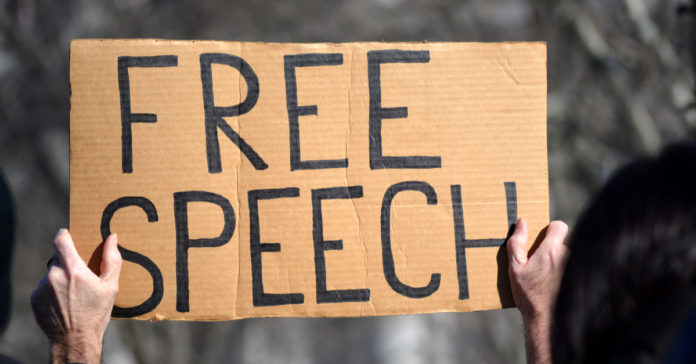In the light of the Batley school controversy, educator Yusuf Patel says the unbridled “right to ridicule” is practised only against Muslims and if it were practised by everyone it would lead to a monstrous and cruel society.
With all the talk about freedom of speech, you’d think it’s both a sacred idea or an absolute right. But we all know that no one has the right to say anything they want.
There are legal restrictions on what we can all say. There are incitement laws, laws outlawing hate speech, and defamation laws which curtail speech. No one can publish defamatory statements which injure another’s reputation without consequence.
There are also social norms which we all choose to live by in a society to maintain cohesion. For example, we have the right to walk up to someone and insult their mother, but we wouldn’t do so. People who go against social norms will be called out for contravening established social conventions.
And there are some things which society has agreed should not be made light of. When Piers Morgan minimised Meghan Markle’s experiences with her mental health problems, including suicide, he was rightly called out.
Neither do we accept that racist language is free speech, or that rape should be the subject of comedy, or that the Holocaust should be questioned as a historical genocide.
Indeed, the “right to ridicule” if practiced by everyone in whatever way they want would lead to a monstrous and cruel society. I’m sure not even the most die-hard proponents of such a theoretical construct of individual right would want to live in such a society.
Subscribe to our newsletter and stay updated on the latest news and updates from around the Muslim world!
Batley Grammar School
The defenders of the Batley Grammar School teacher claim that the Religious Studies lesson covered the contentious topic of blasphemy. If that were the case, that still does not explain why the infamous cartoon image of the Prophet Muhammad (pbuh) with a turban bomb should have been shown in a classroom with Muslim children.
People are free to question whether they agree with the existence of blasphemy laws without including that image. Similarly, one can have a productive discussion about the Holocaust without subjecting Jewish children to images of emaciated corpses.
Having been supporting my son through GCSE Religious Studies, there is no content which asks students to refute religious practices or responses. It is a very benign subject which may ask for different perspectives to be considered and weighed up, but there is no instance where a particular resource, especially a controversial one, must be used.

The misplaced, populist intervention of the Tory Education Secretary Gavin Williamson in defence of the teacher is something we have come to expect from white, privileged politicians who have no idea about the experiences of non-white people.
In 21st century Britain, for a white, non-Muslim teacher to judge and then justify the use of a hurtful and insensitive resource to Muslim pupils suggests a lack of understanding of the very pupils under his care.
According to reports, the school minimised the concerns of parents when they were first raised, but once they recognised that there was likely to be a community backlash they provided a welcome apology.
During the lesson in question, the teacher is reported to have recognised that Muslim students would find the image offensive. This implies he was insensitive to the experiences of discrimination, racism and Islamophobic tropes that young Muslims have to face.
Instead, he relied on “his right” to freedom of expression over the feelings of his pupils. When a parent complained, the teacher was allegedly immediately dismissive to the concerns of the parent, minimising his concerns. But parents are the primary stakeholders in any school so when a parent is dismissed like this it promotes escalation rather than resolution.
Media demonisation
The way politicians and the media have been speaking, it presupposes that schools have permission to deal with all controversial views. This is at odds with the chilling effect of the Prevent Strategy, which has muzzled the voice of Muslim children, making them think twice about what they can and cannot say in case a controversial view is judged to be “extremist.” This has created a two-tiered freedom to speak, which depends on whether your name is Mark or Muhammad.
The narrative set by the media and politicians can make a hero into a villain and a criminal into a victim. The media does not tell the truth; they tell the story which feeds their narrative and chimes with their audience. This applies to tabloids, broadsheets as well as commercial and public service broadcasters, to lesser or greater degrees.
What this tells us is that our narrative as a Muslim community in controversial topics will never break through the propaganda. This is because we are still considered alien, a malign force, the “other,” and overall guilty before proven innocent.
On media platforms we are still caricatured and considered extremists unless we condemn acts of violence committed by those who may share our name. This will not change. But the worst thing we can do is respond to the pressure by becoming what our detractors want us to be. For instance by condemning other Muslims who defend their deen because it makes us look good, or by diluting what we believe to make it palatable to the gaze of a secular-liberal society.
Every society has its sacred cows. Instead of denying this we should acknowledge people have different conceptions of what is sacred. Allah SWT and His Messenger (pbuh) are dearer to us as Muslims than our mothers and fathers, wives or children. Don’t tell Muslims to suck it up and live with the consequences of freedom of speech. We can all see the hypocrisy in application. Just be clear that your sacred is not our sacred and you do not have any tolerance for what we regard as sacred. Then we can know where we stand, without the pretence, the doublespeak and the hypocrisy.
Do protests work?
Many may disagree with this but protesting outside schools does not achieve results. The Birmingham example showed how the mainstream media and politicians will always collude to malign protestors as “mobs,” as they’ve done in this case. Park View School was the aggressor in Birmingham but the media and politicians obscured the issues and presented the school as the victim of the baying, brown, male mob.
Protesting, like petitions, engagement with schools and the like are a means to an end, not an end in itself. I tell parents the threat of conflict for any school, is far greater in impact than the protest itself.

Once protests happen, we are on the losing side of the argument. If our intention is to convince schools to change their minds about a matter, we have to think more strategically. That does not mean we should not challenge schools in relation to RHE/RSHE or any other concern; what it means is we have to take the steps that will help us achieve the results we want.
In Birmingham and Batley, I’m fully on the side of the parents. They have clear concerns with the school, but protests are not the solution. Protests are an own goal.
Finally, although we may feel victimised, we must never embrace the attitude of the victim. Allah SWT has not created this greatest Ummah to be a victim, upon whom things are done. We do things, we embrace actions, we strive to protect our values and the values of our children, we rely on Allah SWT. We ask Him for His guidance, support and steadfastness.
We view these struggles as temporary, worldly struggles and an opportunity to show our commitment to the glorification, worship and obedience of the One who created us for a distinct and superior purpose.
“And who is better in speech than the one who calls to Allah, works righteous deeds, and says ‘Indeed I am of those who are Muslims!’” (Fussilat:33)


















